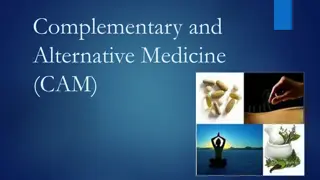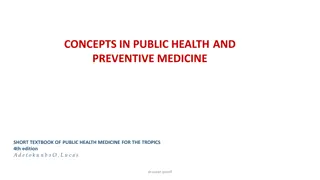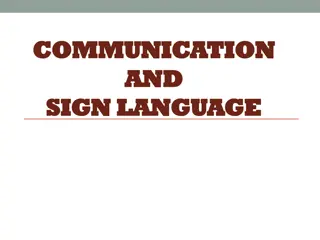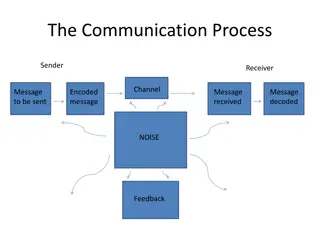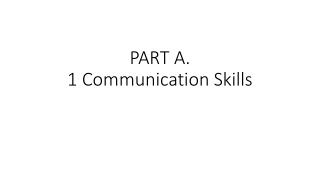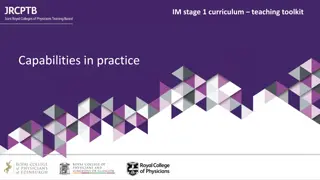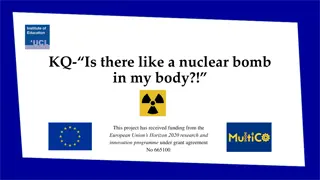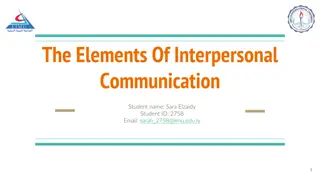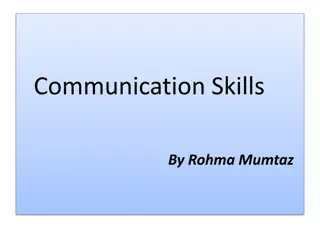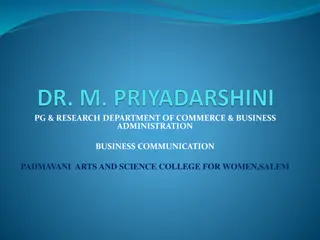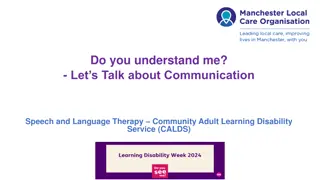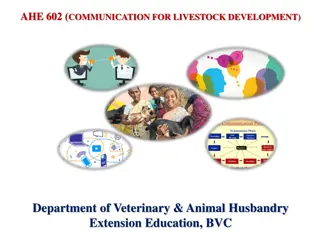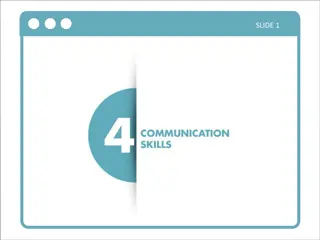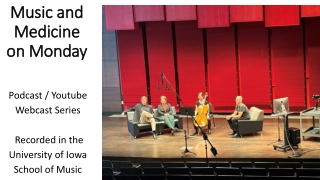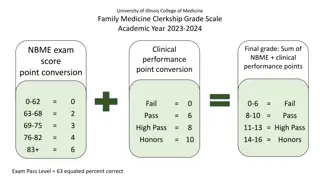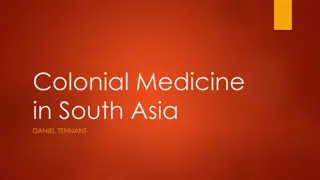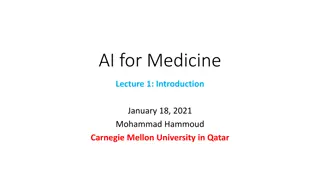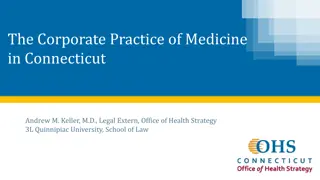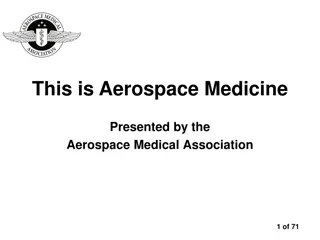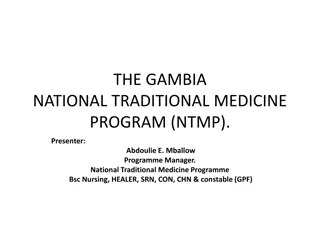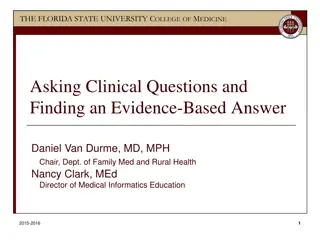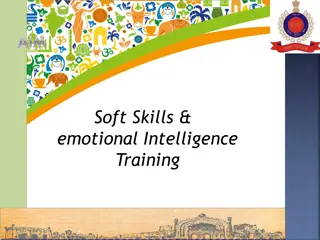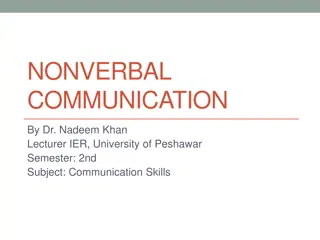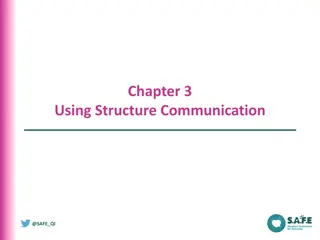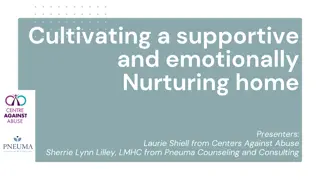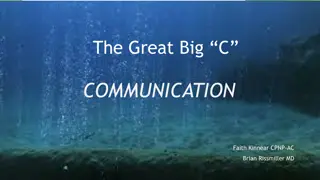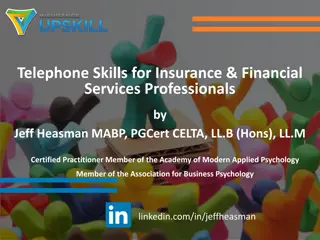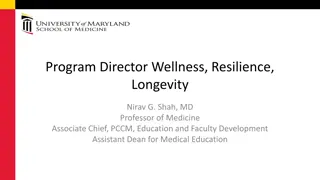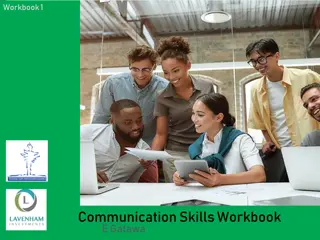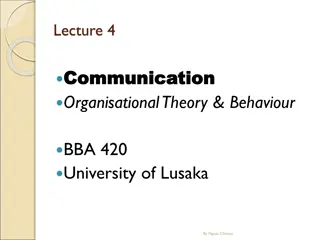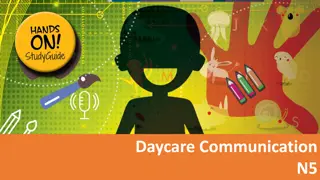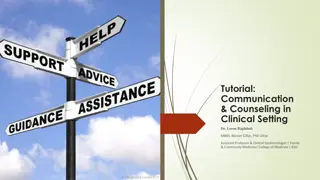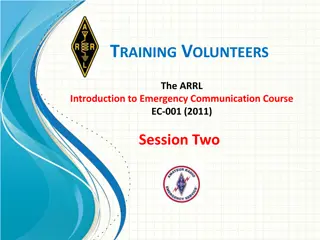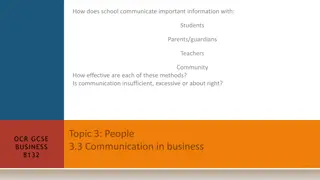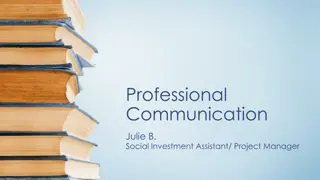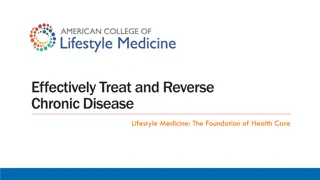Importance of Communication Skills in Medicine
Effective communication skills are vital in the field of medicine for building strong patient-provider relationships. This article emphasizes the significance of communication theories, types, and barriers, along with strategies to enhance communication in medical practice.
Download Presentation

Please find below an Image/Link to download the presentation.
The content on the website is provided AS IS for your information and personal use only. It may not be sold, licensed, or shared on other websites without obtaining consent from the author. Download presentation by click this link. If you encounter any issues during the download, it is possible that the publisher has removed the file from their server.
E N D
Presentation Transcript
The Concept of Communication Skills in Medicine DR. KAMRAN SATTAR MBBS, FAcadMEd AoME (UK) MMedEd UoD (UK) Dept. of Medical Education, King Saud University. https://www.skillpro.com/webinar/communicating-to-reduce-misunderstanding-and-conflict-7/
OBJECTIVES At the end of today s session students should be able to; Define communication, its theory and types. Describe the importance of communication in medicine. Demonstrate effective communication in day to day practice. Overcome barriers to effective communication. Apply the principles of communication and collaboration skills in PBL sessions
Communication Skills There is substantial evidence indicating that communication skills are crucial in the development of satisfactory health care provider-patient relationships. [1-4] In the 21st century, teaching and assessment of communication skills in medical schools are well recognized [5]. Effective communication is considered to be one of the most important skills of a physician [6].
SaudiMEDS ABMS AAMC COMMUNICATION (An essential competency) GMC ACGME WFME Saudi MEDS: Saudi MEDs Framework, ACGME: Accreditation Council for Graduate Medical Education , ABMS: American Board of Medical Specialties, AAMC: Association of American Medical Colleges, GMC::General Medical Council, WFME: World Federation for Medical Education (7-11)
What is Communication? The act by which information is shared. It is the process by which we relate and interact with other people. It includes listening & understanding with passion & respect as well as expressing views, ideas and passing information to others in a clear manner.
COMMUNICATION THEORY Communication is a learned skill based on 3 pillars: Accuracy Efficiency Supportiveness All of the above combine to contribute to the effectiveness of good communication
WRITTEN COMMUNICATION Clarify your thoughts and the purpose Identify the key points, facts and themes Decide on a logical order Use short paragraphs and sentences Compose a strong introduction and ending /http://www.learndirect.com/store/business-workplace/communication-skills http://www.englishgrammar.org/effective-business-writing
Verbal(mainly focuses on questioning) Open (broad) gives control to respondent, allows disclosure. e.g. explain how you felt on the 1st day of college? Open (focused) gives control to respondent within a given area, encourages disclosure of feelings. e.g. Did you have a good day at school Closed control is with interviewer, checks information. e.g. Do you smoke? Yes or No Leading control with interviewer, suggests desired response. e.g. What year in the 15th century did Columbus arrive in the Americas?
Verbal Communication Speaking to the person Look straight in the eye make eye contact Show respect Clear message Relevant Use understandable language Support by illustrations if needed Good listener Allow others to understand the message and reply Listen carefully Make a dialogue ant not one way instruction
NON VERBAL Listening (active and passive) Silence Touch Hand gestures Eye contact Posture Facial expression
Effective Communication Specifically, effective communication skills have been shown to improve providers interviewing skills, facilitate information-gathering, and decrease malpractice claims [12] Malpractice claims Interviewing skill information- gathering
Communication: Why? Effective communication is the basis of mutual understanding & trust. Poor communication causes a lot of misunderstanding & hinders work & productivity.
Communication: Why? Cont. Good Communication is needed to: Develop relationships Increase our knowledge Make our feelings and thoughts known Find out about people Find out information
Communication & Medicine Historically the emphasis was on the biomedical model in medical training which places more value on technical proficiency than on communication skills. Recently learning communication skills & evidence based practice become the corner stones of modern medicine.
Communication in medicine Increases patient satisfaction and health outcomes (Barlett, Grayson et al., 1984) Reduces the risk of complaint and litigation (Beckmam 1994) Higher levels of job satisfaction (Kramer et al., Suchman et al., 1993)
From the doctors What is required Towards the patients . Listen to patients and respond to their concerns and preferences. Give patients information in way they can understand Taking patient s views into consideration when assessing their condition Respond to patients questions , keep them informed & share information .
From the doctors What is required (cont: ) Towards your patients You must make sure, wherever practical, that arrangements are made to meet patient s language and communication needs. You must be considerate to relatives, carers and partners in providing information and support
From the doctors What is required (cont: ) Towards your colleagues Communicate effectively with colleagues within and outside the team Make sure your colleagues understand your role and responsibilities in the team and who is responsible for each aspect of patient care You must treat your colleagues fairly and with respect
Why do the doctors need to practice good communication? Doctors need to learn essentials of good communication more than other professionals because patients are humans with sensitive needs. Doctors cannot practice medicine without effective communication skills. Poor communication causes a lot of medico-legal and ethical problems.
Communication: With whom? Patients & care-givers Nurses & auxiliary staff Colleagues Administrators Reporting research findings Talking to the media Public & legislature
Where to apply our Communication skills ? The medical interview is the usual communication encounter between the doctor and the patient It can be classified according to the purpose of the interview into 4 types: 1. History taking 2. Consultations 3.Obtaining informed 4. Breaking bad news Consent
Effective communication Ensures good working relationship Increases patients satisfaction Increases patients understanding of illness & management Improves patients compliance with treatment Reduce medico-legal problems Reduce uncertainty
Principles of effective communication Planning Interaction rather than a direct transmission Flexibility in relation to different individuals and contexts. Ability to handle emotional outbreaks
Communication with peers Mutual trust & respect Exchange information Ask your seniors
Communication & Medical care Good communication should be established between the patient , the family and the treating multidisciplinary team. Patient & family should be encouraged to participate and verbalize in the ward round discussion about: Offered medical care & treatment Rehabilitation Follow- up/re-admission plans Doubts & worries. Proper information to patient and family regarding services available and how they can utilize them.
Communication skills: Some techniques PRACTICE- fluent dialogue with patient USE- silence effectively, allowing patient enough time to express thoughts or feelings ENCOURAGE- patients with your supportive words UTILIZE - non-verbal communication
Listening vs Hearing Hearing- a passive activity; no effort Listening Attention Active involvement, Full understanding Takes time and effort
Barriers to effective communication Personal attitudes Ignorance Human failings (tiredness, stress) Language Poor time management Strenuous working environment
Conclusion Effective communication is the key to success in professional career. Good communication is essential for proper doctor-patient relationship and help avoids problems of misunderstanding.
Further reading Effective Interact Interaction with Patients. Faulkner, A (2001), 2nd Ed. Churchill Livingstone, London. Clinical Communication in Medicine Editors(s): Dr Jo Brown, Dr Lorraine M. Noble, Dr Alexia Papageorgiou, Dr Jane Kidd. Print ISBN:9781118728246 |Online ISBN:9781118728130 |DOI:10.1002/9781118728130 The Complete Guide to Communication Skills in Clinical Practice (pdf). Walter F. Baile, M.D https://www.mdanderson.org/documents/education- training/icare/pocketguide-texttabscombined-oct2014final.pdf
References 1. Hochman O, Itzhak B, Mankuta D, Vinker S. The relation between good communication skills on the part of the physician and patient satisfaction in a military setting. Mil Med 2008;173(9):878 81.PubMedGoogle Scholar 2. Leite R, Makuch M, Petta C, Morais S. Women s satisfaction with physicians communication skills during an infertility consultation. Patient Educ Counsel 2005;59(1):38 45.CrossRefPubMedGoogle Scholar 3. Greco M, Spike N, Powell R, Brownlea A. Assessing communication skills of GP registrars: a comparison of patient and GP examiner ratings. Med Educ 2002;36(4):366 76.CrossRefPubMedGoogle Scholar 4. Jackson JL, Chamberlin J. Predictors of patient satisfaction. Soc Sci Med 2001;52(4):609 18.CrossRefPubMedGoogle Scholar 5. Hausberg MC, Hergert A, Kr ger C, Bullinger M, Rose M, Andreas S (2012) Enhancing medical students' communication skills: Development and evaluation of an undergraduate training program. BMC Medical Education 12: [PMC free article] [PubMed] 6. Baig LA, Violato C, Crutcher RA (2009) Assessing clinical communication skills in physicians: Are the skills context specific or generalizable. BMC Medical Education 9: [PMC free article] [PubMed] 7. Accreditation Council for Graduate Medical Education (ACGME) (2007) Common program requirements. Available: https://www.acgme.org/acgmeweb/Portals/0/PFAssets/ProgramRequirements/CPRs_07012015.pdf Accessed 15 Oct 2015. 8. American Board of Medical Specialties (ABMS) (2014) Standards for the ABMS Program for Maintenance of Certification (MOC). Available: http://www.abms.org/media/1109/standards-for-the-abms-program-for-moc-final.pdf Accessed 15 Oct 2015. 9. Association of American Medical Colleges (AAMC) (1998) Report I. Learning objectives for medical student education. Guidelines for medical schools. Available: https://members.aamc.org/eweb/upload/Learning%20Objectives%20for%20Medical%20Student%20Educ%20Report%20I.pdf Accessed 16 Oct 2015. 10. General Medical Council (GMC) (2009) Tomorrow s doctors. Outcomes and standards for undergraduate medical education. Available: http://www.gmc- uk.org/Tomorrow_s_Doctors_1214.pdf_48905759.pdf Accessed 15 Oct 2015. 11. World Federation for Medical Education (WFME) (2015) Basic medical education. WFME global standards for quality improvement. The 2015 revision. Available: http://wfme.org/standards/bme/78-new-version-2012-quality-improvement-in-basic-medical-education-english/file Accessed 15 Oct 2015. 12.. Smith RC, Lyles JS, Mettler J, et al. The effectiveness of intensive training for residents in interviewing. Ann Intern Med 1998;128(2):118 26.PubMedGoogle Scholar
THANK YOU VERY MUCH http://t0.gstatic.com/images?q=tbn:ANd9GcQtZVqWJQm8I5qn16DBMp1tM_xSAGaLvtiRqXen13CAGRTwGzXB & &



